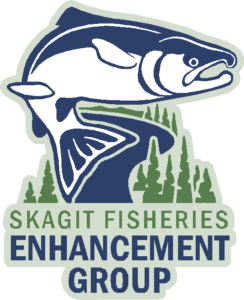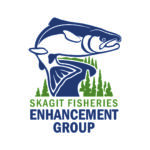Spawner Survey Internship Fall 2025
Do you like working outside? Want to learn more about salmon and habitat restoraion?
The spawner survey intern assists SFEG staff in implementing the spawner survey program for selected restoration sites in the Skagit and Samish Watersheds. The intern will participate in the SFEG spawner survey workshop on October 4th 2025, receive training in how to identify adult salmon species and redds, conduct weekly surveys on one or more streams, and assist with data entry, analysis, and reporting. This program documents salmon spawning in proposed and completed restoration sites. This information is useful in understanding the effectiveness of restoration efforts and is used by WDFW for escapement forecasting. The intern works with SFEG field staff and other volunteers to carry out this work. MUST BE ABLE TO USE A PERSONAL VEHICLE TO GET TO WORK SITES.
The spawner survey intern may be invited to assist with other activities such as weekend work parties and juvenile salmon data collection for additional experience/hours.
SFEG is committed to creating a diverse and inclusive workplace. We strongly encourage people of all backgrounds to apply for this internship opportunity. The outdoors should be for everyone and we know that has traditionally not been the case, with many people being left out of environmental based careers. We recognize the need to confront this inequity within our organization. SFEG is actively working to create more avenues for entry level positions for traditionally marginalized communities to work in the environmental field.
Qualifications
Applicants should have a background and interest in environmental science/studies, biology, monitoring, outdoor recreation, and/or salmon. Applicants must be able or willing learn to identify native Pacific salmon. Must have the ability to work with volunteers and provide own vehicle for transportation. This position requires work outside in all types of weather, and the applicant must be capable of walking on uneven ground. (Other gear such as waders and boots will be provided).
Time Commitment: This position begins October 1, 2025 and will be concluded early March 2026. The Intern will work with SFEG staff and/or volunteers 1-2 weekdays per week. Regular work hours TBD.
Compensation: This is a volunteer position with a $3,000 total stipend available in monthly installments, upon successful completion of monthly and total hours.
To Apply: Upload Resume with Online Application
SFEG will provide equal opportunity for employees and applicants without regard to race, color, religion, national origin, gender, age, sexual orientation, sensory, physical or mental disability, veteran status, protected genetic information or any other status protected under state or federal law.














